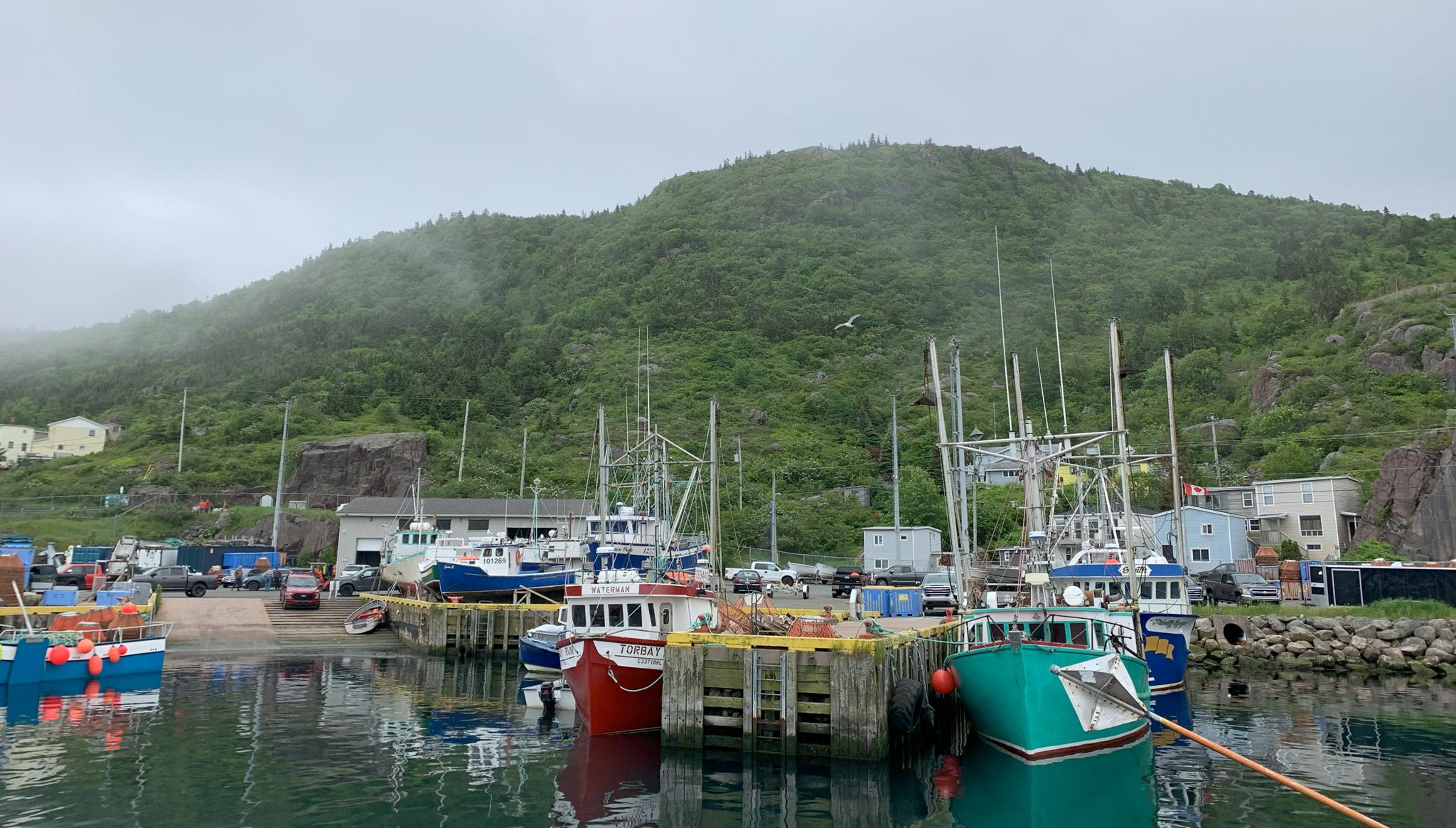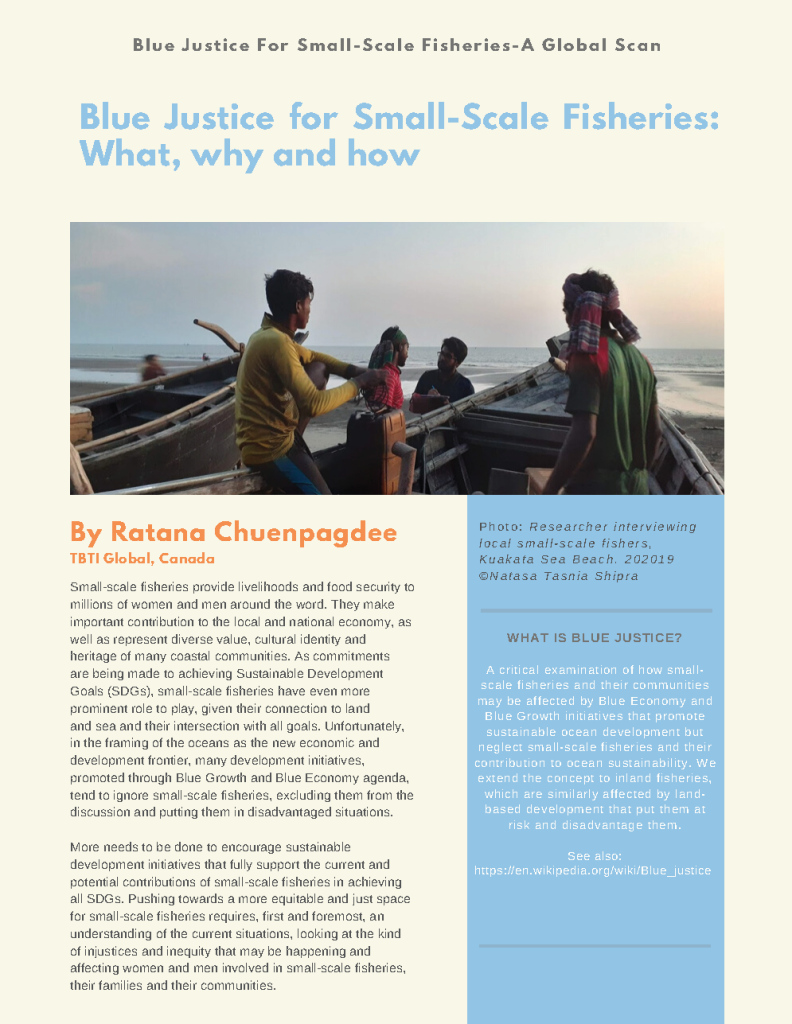
Photo by Nantakorn Chayangkul
TBTI for Blue Justice. Blue Justice for Small-Scale Fisheries.

Blue Justice at a glance


How to talk about Blue Justice for Small-Scale Fisheries?
Addressing Epistemic Blue Injustice in Small-Scale Fisheries
Millions of people around the world are highly dependent on small-scale fisheries for livelihood, food provisioning and community well-being. Despite their importance, the voice of small-scale fishers is often dismissed due to epistemic injustice — those in which the capacity of fishers as knowers has been diminished — leading to systemic marginalization. A study of 20 testimonies of injustices results in a glossary of terms that captures testimonial and hermeneutical injustice experienced by small-scale fisheries people. It argues that filling conceptual gaps could help fishers to express their experiences in an effective way, contributing to a better understanding and appreciation of the situation that small-scale fisheries are in. Having their own language to talk about different types of Blue (in)Justice will also enhance local empowerment and mobilize support.
The glossary is based on the TBTI article on ‘Blue Justice and the co-production of hermeneutical resources for small-scale fisheries’, written by Milena Arias Schreiber, Ratana Chuenpagdee and Svein Jentoft, published in Marine Policy.
The glossary is available in English, French, Japanese, Portuguese, and Spanish. If you would like to help translate the glossary to other languages, please send us an email at [email protected].
Book: Blue Justice: Small-Scale Fisheries in a Sustainable Ocean Economy
For small-scale fisheries around the world, the Blue Growth and Blue Economy initiatives may provide sustainable development, but only insofar as they align with the global consensus enshrined in the Voluntary Guidelines for Securing Sustainable Small-Scale Fisheries in the context of Food Security and Poverty Eradication. If states do nothing to fulfill the promises they made when they endorsed these guidelines in 2014, the Blue Economy will come at a loss for small-scale fisheries and further their marginalization in the ocean economy.
Under the umbrella of Blue Justice, this book demonstrates that these risks are real and must be considered as states implement their sustainable ocean development plans. These are human rights issues, which are embedded into governance principles and institutions and which make a difference for small-scale fisheries people in their daily lives. In stressing the importance of policies and institutions that build on the experiences of small-scale fisheries people in the contexts in which they operate, this book draws on case studies of small-scale fisheries from countries on all continents to clarify what Blue Justice entails for small-scale fisheries and make suggestions for real change.
The volume was developed through the TBTI ‘Blue Justice’ initiative and includes case studies from all regions of the world with contributions from 70 authors from multiple backgrounds and disciplines.
E-book: Blue Justice for Small-Scale Fisheries – A Global Scan
Pushing towards a more equitable and just space for small-scale fisheries requires, first and foremost, an understanding of the current situations, looking at the kind of injustices and inequity that may be happening and affecting women and men involved in small-scale fisheries, their families and their communities.
With this in mind, TBTI has gathered stories and examples of policies, programs, projects, initiatives, regulatory frameworks, as well as other situations that create different types of injustice and inequity in small-scale fisheries.

'Blue Justice - Alert to Action' Global Campaign
On February 20th 2024, the World’s Day of Social Justice, TBTI Global brought forward a collection of stories about Blue Justice in Small-Scale Fisheries from nine countries. Each of the stories depicts issues of (in)justice, in voices of those directly affected – the small-scale fishers themselves.
We summarized these highlights in an infographic and a short video that can be viewed on TBTI YouTube channel. And while you’re there, be sure to check the original videos that were released on February 20th, plus a few more that we have received since then.
Blue Justice Wikipedia entry
Blue Justice reflects a critical examination of how coastal communities and small-scale fisheries may be affected by blue economy and ‘blue growth’ initiatives — initiatives that are being undertaken by institutions and governments globally to promote sustainable ocean development. The blue economy is also rooted in the ‘green economy’ and the UN Sustainable Development Goals, underlying sustainable development globally. Blue Justice acknowledges the historical rights of small-scale fishing communities to marine and inland resources, and coastal space, as traditional users for thousands of years in some cases. Thus, as a concept, it seeks to investigate pressures on small-scale fisheries, from other ocean uses, including industrial fisheries and coastal/marine tourism, aquaculture or energy production, promoted in the blue economy and blue growth development agenda, and how it may compromise the rights and the wellbeing of small-scale fisheries and their communities.
TBTI articles on Blue Justice
Interactive Learning and Governance Transformation for Securing Blue Justice for Small-Scale Fisheries
Svein Jentoft & Ratana Chuenpagdee, R.
Boosting transdisciplinary research for small-scale fisheries
Ratana Chuenpagdee, Vesna Kerezi, & Svein Jentoft
Analysis / Blue Economy: The Power Game of Language
Svein Jentoft
On and by the water
Svein Jentoft
Splitting hairs
Svein Jentoft


